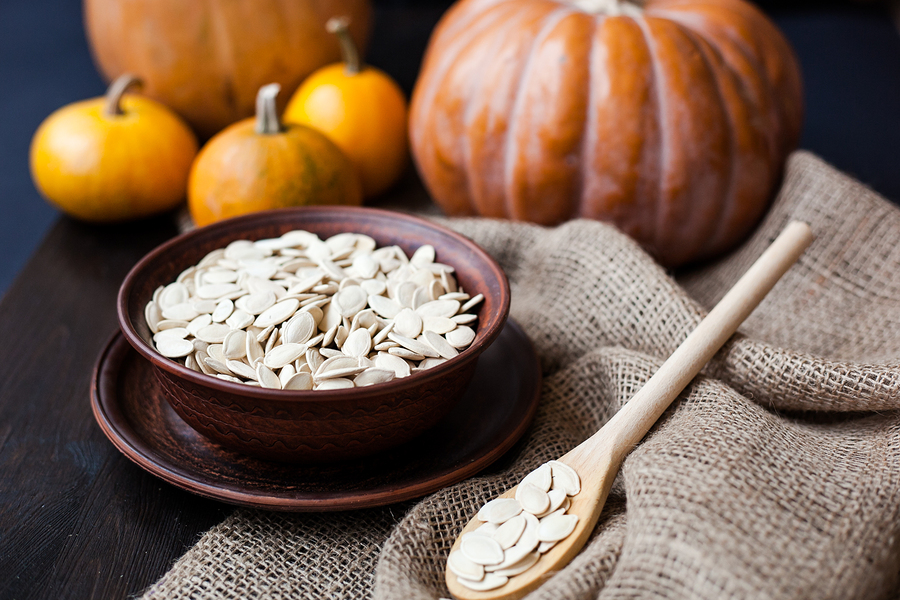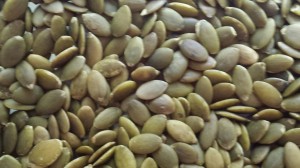
Enjoying Pumpkin Seeds Beyond The Holidays
While roasted pumpkins seeds are probably best known for their role as a perennial Halloween treat, these seeds also known as pepitas are delicious and nutritious, throughout the year.
Pumpkin seeds have been featured in my Grow with Nutrition blogs and star in my book The Need for Seeds. They have been used as a traditional medicine in regions around the world including China, India and Mexico for ailments including diabetes and treatment of worms or parasites. You can buy the seeds raw and shelled, raw and unshelled, roasted and shelled, roasted and unshelled. Let`s explore why and how you can enjoy pumpkin seeds 365 days of the year.
With or Without the Shell?
Pumpkin seeds with the shells (known as the husks) have more fibre, whereas the kernels (the part inside the shell) have more fat and protein. The shell isn’t a significant source of antioxidants, vitamins or minerals, however you will get three times the amount of zinc if you eat the seeds whole (with shell). In a 28 gram (one ounce) serving of whole (with shell), roasted seeds, you’ll get about 125 calories, almost 6 grams of fat, 5 grams of protein, 10 grams of carbohydrates and 5 grams of dietary fibre. In the same amount of unshelled seeds there will be fewer carbohydrates, fibre, but more magnesium. I recommend pumpkin seeds with and without the shell, as they both have beneficial attributes for us.
More Pumpkin Seeds Please!
 Heart Health
Heart Health
Pumpkin seeds are high in omega -3 fats, known for their heart health benefits. Research has shown that consuming pumpkins seeds help decrease blood lipid levels including triglycerides, one of the risk factors for heart disease. Researchers found that rats that ate a diet high in fat while consuming pumpkin seeds had lower blood lipid levels than rats that had high fat diets, but didn’t consume pumpkin seeds (1).
Immune Health
November is dedicated as Diabetes Awareness Month. Animal studies demonstrate that pumpkin seeds have a hypoglycemic effect on blood glucose levels, which may improve insulin regulation (2). This could be due to pumpkin seed’s high antioxidants and fibre levels. Researcher Adams and his team found that blood glucose levels in diabetic rats decreased when they were fed germinant and ungerminated pumpkin seeds (2). More research is needed to indentify the exact mechanism of improved insulin regulation when people with diabetes consume pumpkin seeds.
Skin Health
Antioxidants help combat oxidative stress which can cause early aging and poor skin health. Pumpkin seeds are a very good source of zinc, and zinc is an important antioxidant to protect the skin against UV d amage, enhance wound healing, and reduce the risk of skin cancer (3). Eating pumpkin seeds with all its nourishment including zinc provide the skin with a delicious nutrient cocktail to assist in preventing UV damage and oxidative stress (4).
amage, enhance wound healing, and reduce the risk of skin cancer (3). Eating pumpkin seeds with all its nourishment including zinc provide the skin with a delicious nutrient cocktail to assist in preventing UV damage and oxidative stress (4).
Recipe – Spicing Things Up
With all this goodness, you definitely want to sow pumpkin seeds into your menu year round! Try spicing things up with this recipe for Cajun spiced roasted pumpkin seeds from allrecipes.com. It calls for one cup of whole pumpkin seeds and just a few other ingredients. They are delicious too for a snack, in a salad or sprinkled on grilled white fish. Enjoy! And stay tuned for more seed goodness in my book The Need for Seeds.
References:
- Makni M. et al. Hypolididemic and hepatoprotective effects of flax and pumpkin seed mixture rich in omega-3 and -6 fatty acids in hypercholesterolemic rats. Food and Chemical Toxicology. 2008 Sept 22 [cited 2015 Nov 3];26;3714-3720.
- Adams GG et al. The hypoglycemic effect of pumpkin seeds, trigonelline (trg), nicotinic acid (na), and d-chiro-inositol (dci) in controlling glycemic levels in diabetes mellitus. Critical Reviews in Food Science and Nutrition. 2014 Jan [cited 2015 Nov 3];50(10):1322-1329
- Xanthopoulou MN, Nomikos T, Fragopoulou E, Antonopoulou S. Antioxidant and lipoxygenase inhibitory activities of pumpkin seed extracts. Food Research International. 2009 July [cited 2015 Nov 3]; 42(6):641-646.
- Rostan EF, Debuys HV, Madey DL, Pinnell SR. Evidence supporting zinc as an important antioxidant for skin. International Journal of Dermitology. 2002 Oct 3[cited 2015 Nov 3];41(9): 606-611.
